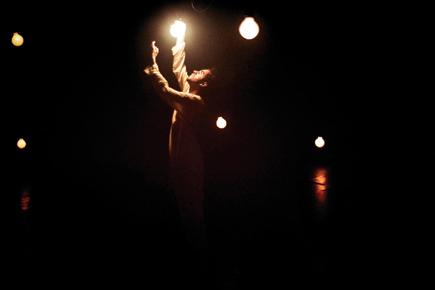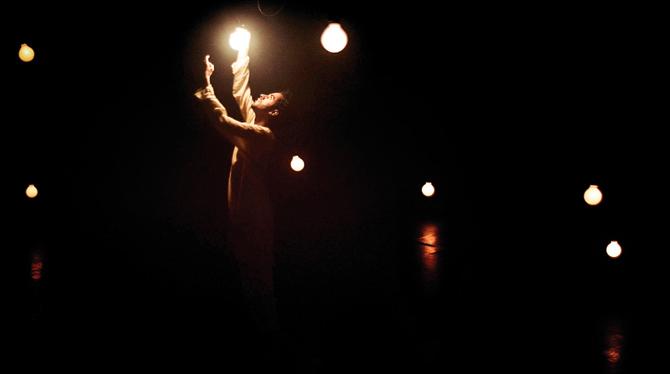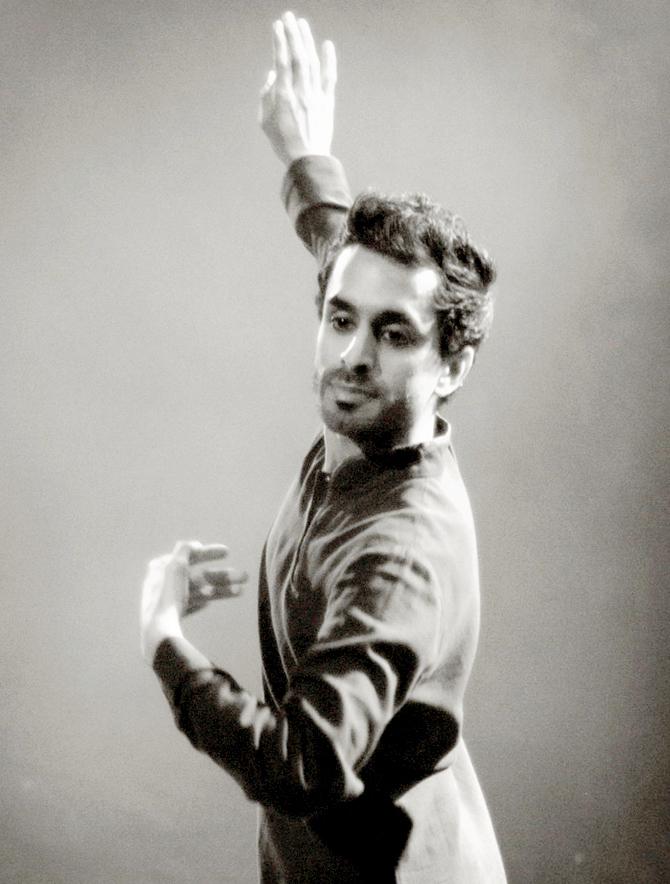British-Indian dancer Aakash Odedra hopes to stir audiences with a weekend dance act, Rising — a contemporary cum classical tribute to his teachers in Mumbai

Aakash Odedra at an earlier performance
![]() This Sunday, British dancer Aakash Odedra will perform his piece, Rising, after having showcased it 176 times across 20 countries. This show he says, is a tribute to his Mumbai dance gurus Shiamak Davar and Chhaya Kantaveh. The act will feature solos created by Akram Khan, Sidi Larbi Cherkaoui and Russell Maliphant along with Odedra’s own piece. With lighting by Sadler’s Wells Associate Artist, Michael Hulls and Willy Cessa, and musical contributions from composer Jocelyn Pook (Of Eyes Wide Shut, Merchant of Venice and Gangs of New York fame), this is going to be a fine celebration of his Classical Indian dance background in Kathak and Bharatanatyam and passion for contemporary dance. Excerpts from an interview:
This Sunday, British dancer Aakash Odedra will perform his piece, Rising, after having showcased it 176 times across 20 countries. This show he says, is a tribute to his Mumbai dance gurus Shiamak Davar and Chhaya Kantaveh. The act will feature solos created by Akram Khan, Sidi Larbi Cherkaoui and Russell Maliphant along with Odedra’s own piece. With lighting by Sadler’s Wells Associate Artist, Michael Hulls and Willy Cessa, and musical contributions from composer Jocelyn Pook (Of Eyes Wide Shut, Merchant of Venice and Gangs of New York fame), this is going to be a fine celebration of his Classical Indian dance background in Kathak and Bharatanatyam and passion for contemporary dance. Excerpts from an interview:

Aakash Odedra at an earlier performance
Q. When did you discover dance as your calling?
A. It’s like asking a fish, how did you learn to swim? Dancing was in my blood. It was everywhere. Whether I opened a door or picked up a glass, I felt it was choreographed. Whenever I heard music, I danced. Officially, I started learning dance at the age of 8. I started with Kathak and then, Bharatanatyam in the UK. Thirteen years ago I came to India to train with Shiamak Davar and Chhaya Kantaveh. I was part of Shiamak’s company for two years. I did contemporary and Indo-Jazz.

Aakash Odedra, Dancer
Q. Did your family accept your career choice?
A. My family was broad-minded about my dance, but the Kathiawadi Rajput community was more orthodox and didn’t think men should dance the way I did. But my grandmother was supportive. Dance was in my breath. Though I was learning in Britain, in my mind, I was always in India.
Q. Which form do you enjoy the most?
A.It’s like eating dal chawal and a different sabzi. Each form gives you a variety and a different satisfaction. The form of the body and the space is very different in each form. I enjoy them all.
Q. How much difference does your background in the Indian Classical form make to your dance and compositions?
A. Indian Classical has been my roots since I started young. Often, I find that I have to deconstruct myself for my choreographies. I need some of the movements to be unequal at times. A classical presentation can be highly constructed at most times. On the other hand, Classical dance involves a lot of Mathematics and calculations, so, when you have learnt a Classical form, it becomes easier for the body to form its own mechanics in a systematic way and adapt to each choreography.
Q. Tell us about being mentored by Akram Khan. What were some of the life lessons that came along the way?
A. I performed at the Royal Opera House in 2003. That’s where Akram first saw my performance and remembered me. I worked with him in 2008-2009 and performed with his company. He taught me to express thematically and look at a larger context. Both of us have trained in Kathak but our bodies are very different. I’m light like a feather and his performance is like a bolt of lightning. It’s very powerful. Even today, when he is in the audience, I’m terrified because it’s like he can see through me.
Q. How was the experience of learning from Shiamak Davar and Chhaya Kantaveh?
A. When I started learning from them, I was going through a very difficult phase in my personal life. They drew me out. That is the period where I grew from a boy to a man. It was tough. We rehearsed till 5 am sometimes; both had a no-nonsense attitude. They taught me discipline. Before I met them, I didn’t know anything about professionalism and presentation. They also taught me about the soul of dancing and feeling it rather than just performing.
Q. Who are some of the most inspiring performers who might have impacted your evolution as an artiste?
A. Aditi Mangaldas and Kumudini Lakhia (the chorographer of the original Umrao Jaan). I often say that when Aditi is performing, she is like a sorceress who has the ability to capture people and make you time travel. Sometimes she manages to do that with her sheer presence on stage. Recently, she choreographed a piece for me that I performed a couple of days ago. It’s called Echoes and is about ancestry, your roots and vibration.
Q. What can audiences in India expect from your upcoming performance?
A. This performance will be special. I’ve been training every day for the last one month. This one is for my gurus and I feel like I’m back to being that 18-year-old boy who came here to learn. So emotionally, I am in a different space and I even move differently when I am emotional.
Q. What advice do you have for young Indian performers who aspire to become proffesional dancers?
A. Be sincere and loyal to the people you are learning from and yourself. Don’t get caught up in where you have reached and where you want to be. Follow your heart and you will achieve.
 Subscribe today by clicking the link and stay updated with the latest news!" Click here!
Subscribe today by clicking the link and stay updated with the latest news!" Click here!







